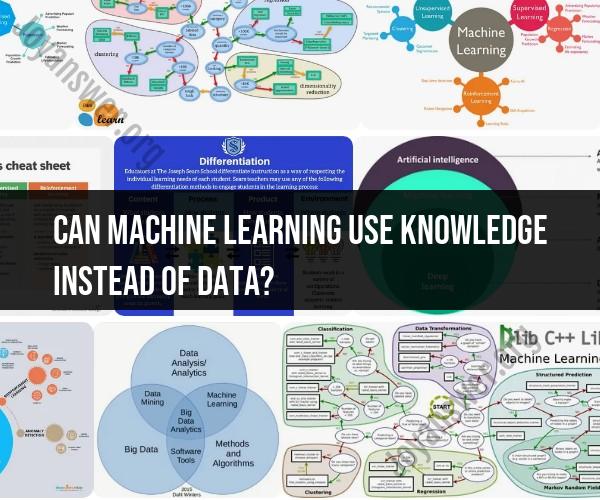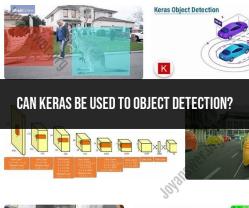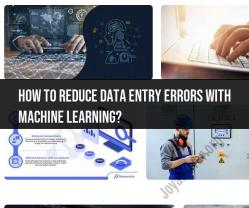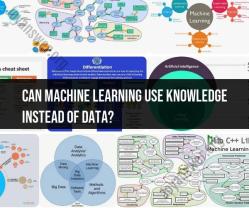Can machine learning use knowledge instead of data?
Machine learning typically relies on data for training models and making predictions. However, there are approaches in machine learning and artificial intelligence (AI) that involve leveraging knowledge in addition to or instead of data. These approaches are often referred to as "knowledge-based" or "knowledge-driven" methods. Here's an overview:
1. Knowledge-Based Systems:
- Knowledge-based systems, also known as expert systems, rely heavily on domain-specific knowledge represented in a structured format. These systems use rules, ontologies, and knowledge graphs to reason and make decisions. Knowledge-based systems are often used in areas like medical diagnosis, finance, and engineering, where expert knowledge is critical.
2. Rule-Based Systems:
- Rule-based systems use explicitly defined rules to make decisions or perform tasks. These rules are often written by experts in a particular domain and can be used to encode specific knowledge. For example, a rule-based system for credit approval might use rules like "If income > $50,000 and credit score > 700, approve the loan."
3. Semantic Web and Ontologies:
- The Semantic Web is an initiative to make web content more machine-readable by adding semantic meaning to data. Ontologies, which define relationships between terms and concepts, play a crucial role in the Semantic Web. Machine learning models can leverage ontologies to extract and reason about knowledge from structured data sources.
4. Knowledge Graphs:
- Knowledge graphs are graphical representations of knowledge, where entities (e.g., people, places, concepts) are connected by relationships. They provide a way to organize and query structured knowledge. Machine learning techniques can be applied to knowledge graphs for tasks such as entity linking, relation extraction, and question answering.
5. Natural Language Understanding:
- Natural language understanding (NLU) models, which are part of AI and machine learning, aim to extract knowledge and meaning from text and unstructured data. NLU models can parse text to identify entities, relationships, and concepts, enabling the extraction of knowledge from textual sources.
6. Hybrid Approaches:
- Some machine learning applications combine both data-driven and knowledge-driven approaches. For instance, a recommendation system might use user data to personalize recommendations but also incorporate knowledge about product categories or user preferences.
While data-driven machine learning approaches dominate in many applications, knowledge-driven approaches remain valuable, especially in domains where expert knowledge is readily available and interpretability and explainability are crucial. The integration of both data and knowledge in AI and machine learning systems is an active area of research and development, aiming to combine the strengths of both approaches for more effective and reliable decision-making.
Knowledge-Based Machine Learning: Exploring Data-Free Approaches
Knowledge-based machine learning (KBML) is a field of machine learning that uses knowledge to train models without data. This is in contrast to traditional machine learning algorithms, which require large amounts of data to learn.
KBML is still a relatively new field, but it has the potential to revolutionize machine learning. By eliminating the need for data, KBML can make machine learning more accessible and affordable for a wider range of applications.
There are a number of different approaches to KBML. One common approach is to use symbolic logic to represent knowledge. Symbolic logic is a formal language that can be used to represent and reason about knowledge.
Another approach to KBML is to use ontologies. Ontologies are formal representations of knowledge that can be used to describe the relationships between different concepts.
KBML can be used to train models for a variety of tasks, including classification, regression, and prediction. For example, a KBML model could be used to classify emails as spam or not spam, predict the weather, or recommend products to customers.
The Power of Knowledge in Machine Learning: Beyond Traditional Data
Knowledge can play a powerful role in machine learning. By using knowledge, we can improve the accuracy, efficiency, and interpretability of machine learning models.
One way to use knowledge in machine learning is to use it to pre-train models. Pre-training is a technique in which a model is trained on a large dataset of unlabeled data. This pre-training can help the model to learn general-purpose features that can be useful for a variety of tasks.
Another way to use knowledge in machine learning is to use it to constrain the search space. The search space is the set of all possible models that the machine learning algorithm can consider. By using knowledge, we can constrain the search space to include only models that are consistent with our knowledge. This can help to improve the accuracy and efficiency of the machine learning algorithm.
Can Machine Learning Learn Without Data? Exploring Possibilities
It is possible for machine learning to learn without data, but it is still a challenging problem. KBML is one approach to machine learning that can be used to learn without data.
Another approach to machine learning without data is to use reinforcement learning. Reinforcement learning is a type of machine learning in which the agent learns by trial and error. The agent is rewarded for taking actions that lead to desired outcomes and penalized for taking actions that lead to undesirable outcomes.
Reinforcement learning can be used to train models to perform a variety of tasks, such as playing games and controlling robots. However, reinforcement learning can be slow and inefficient, and it is not always possible to define rewards and penalties in a way that leads to the desired behavior.
Conclusion
KBML is a promising field of research with the potential to revolutionize machine learning. By eliminating the need for data, KBML can make machine learning more accessible and affordable for a wider range of applications.
However, KBML is still a relatively new field, and there are a number of challenges that need to be addressed before it can be widely deployed. One challenge is that KBML models can be difficult to develop and maintain. Another challenge is that KBML models are often not as accurate as traditional machine learning models that are trained on data.
Despite these challenges, KBML is a promising field of research with the potential to have a significant impact on the way we use machine learning.




